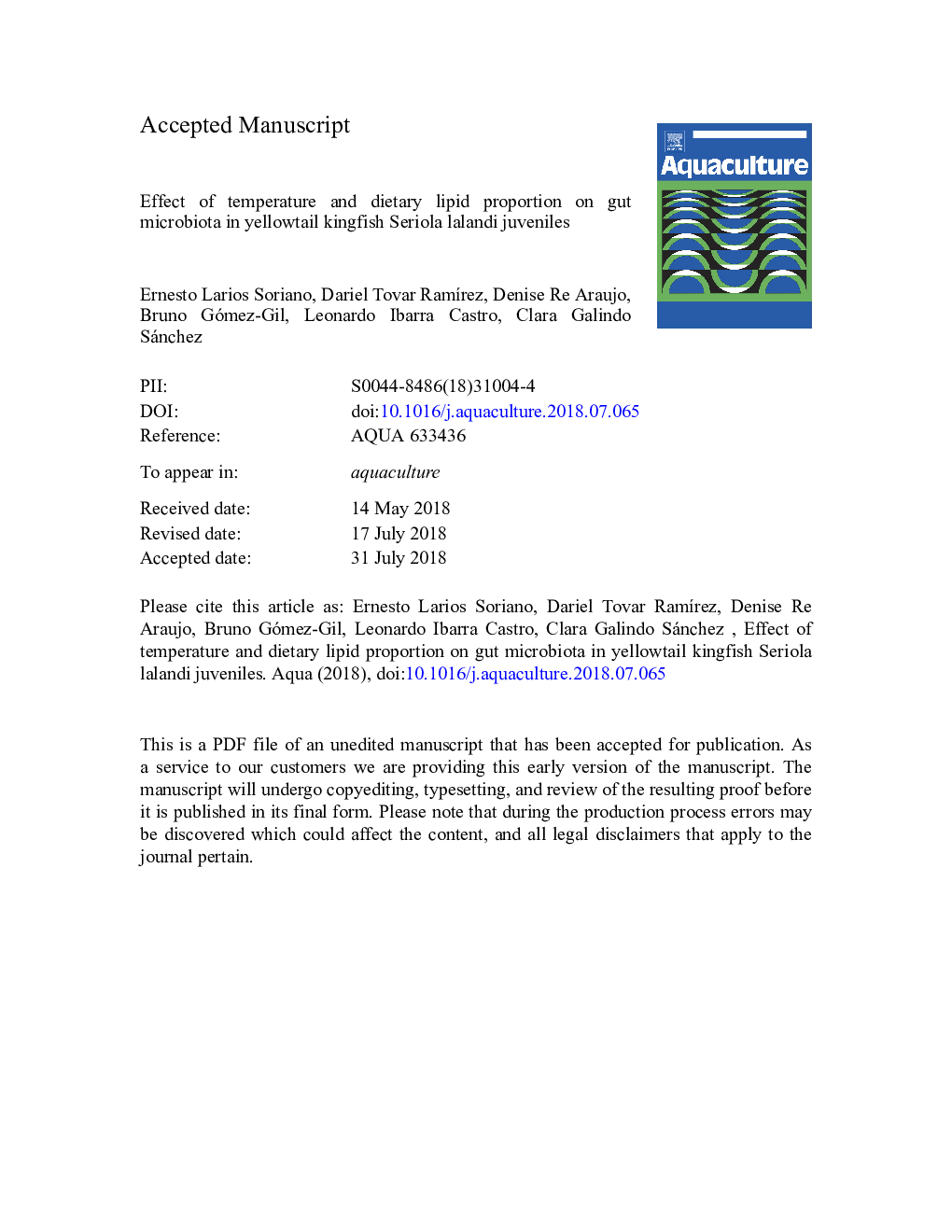| کد مقاله | کد نشریه | سال انتشار | مقاله انگلیسی | نسخه تمام متن |
|---|---|---|---|---|
| 8492955 | 1552791 | 2018 | 30 صفحه PDF | دانلود رایگان |
عنوان انگلیسی مقاله ISI
Effect of temperature and dietary lipid proportion on gut microbiota in yellowtail kingfish Seriola lalandi juveniles
ترجمه فارسی عنوان
تاثیر دمای و نسبت چربی های رژیم غذایی بر میکروبیوتیک روده در نوزادان شاهد زرد
دانلود مقاله + سفارش ترجمه
دانلود مقاله ISI انگلیسی
رایگان برای ایرانیان
کلمات کلیدی
موضوعات مرتبط
علوم زیستی و بیوفناوری
علوم کشاورزی و بیولوژیک
علوم آبزیان
چکیده انگلیسی
Gut microbiota plays a determining role in the health status of the host. In general, a beneficial bacterial community, associated with a greater metabolic capacity and wellbeing, shows high values of species richness and relative abundance. Because environmental temperature is a regulating factor in fish physiological and metabolic processes, it is very important to understand the effect of environmental temperature on diversity and richness of gut microbiota in poikilothermic organisms. This study analysed the reciprocal diet-temperature correlations in the faecal microbiota diversity in Seriola lalandi. Juveniles were acclimated at 20â¯Â°C and 26â¯Â°C for 30â¯days; in addition, the fish were fed three diets with three levels of lipid inclusion (7%, 14% and 21%). Faecal microbiota in S. lalandi was characterized using the high-throughput sequencing approach based on the V3 region of the 16S rRNA gene. The most abundant phyla identified in this study were Proteobacteria, Actinobacteria, Bacteroidetes and Firmicutes. A significant change was observed in faecal microbiota in relation to acclimation temperature. The results indicated that species richness was modified in relation to the environmental temperatures; the Operational Taxonomic Units (OTUs) identified in fish acclimated at 26â¯Â°C belonged to the families Pseudomonadacea, Alcaligenaceae and Microbacteriaceae whereas those identified at 20â¯Â°C were Micavibrio, Comamonadaceae and Saprospiraceae. Furthermore, significant differences were observed between the OTUs identified in the dietary treatments, in which Actinobacteria (7% lipid), Gammaproteobacteria (14% lipid), Betaproteobacteria (21% lipid), and Flavobacteria (skretting diet) were the phyla preferentially identified from each treatment. The results obtained in this study demonstrated the importance of environmental temperature to maintain a balance in intestinal microbiota, as well as the effects of diet composition on proliferation of different microbial groups with respect to thermal induction.
ناشر
Database: Elsevier - ScienceDirect (ساینس دایرکت)
Journal: Aquaculture - Volume 497, 1 December 2018, Pages 269-277
Journal: Aquaculture - Volume 497, 1 December 2018, Pages 269-277
نویسندگان
Ernesto Larios Soriano, Dariel Tovar RamÃrez, Denise Re Araujo, Bruno Gómez-Gil, Leonardo Ibarra Castro, Clara Galindo Sánchez,
